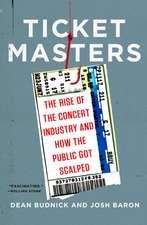Boards at Work: How Directors View their Roles and Responsibilities
Autor Philip Stiles, Bernard Tayloren Limba Engleză Hardback – 29 mar 2001
| Toate formatele și edițiile | Preț | Express |
|---|---|---|
| Paperback (1) | 340.65 lei 31-37 zile | |
| OUP OXFORD – 3 oct 2002 | 340.65 lei 31-37 zile | |
| Hardback (1) | 333.97 lei 31-37 zile | |
| OUP OXFORD – 29 mar 2001 | 333.97 lei 31-37 zile |
Preț: 333.97 lei
Preț vechi: 484.48 lei
-31% Nou
Puncte Express: 501
Preț estimativ în valută:
63.91€ • 66.89$ • 53.19£
63.91€ • 66.89$ • 53.19£
Carte tipărită la comandă
Livrare economică 20-26 martie
Preluare comenzi: 021 569.72.76
Specificații
ISBN-13: 9780198288763
ISBN-10: 019828876X
Pagini: 176
Ilustrații: 3 black and white figures, numerous tables
Dimensiuni: 164 x 243 x 18 mm
Greutate: 0.47 kg
Editura: OUP OXFORD
Colecția OUP Oxford
Locul publicării:Oxford, United Kingdom
ISBN-10: 019828876X
Pagini: 176
Ilustrații: 3 black and white figures, numerous tables
Dimensiuni: 164 x 243 x 18 mm
Greutate: 0.47 kg
Editura: OUP OXFORD
Colecția OUP Oxford
Locul publicării:Oxford, United Kingdom
Recenzii
This work would provide a useful primer for anyone studying the subject ... this is not another normative text on what directors and boards should be doing. Rather it is a valuable work for those who study corporate governance.
Notă biografică
Philip Stiles is Senior Research Associate at the Judge Institute of Management Studies, University of Cambridge. He is executive editor of 'Long Range Planning'.Bernard Taylor is Professor of Business Policy at Henley Management College and Head of the Faculty Group in Strategy and International Business. He is the founder and editor of the journal 'Long Range Planning', and founding editor of the 'Journal of General Management'. Director of the European Council on Corporate Strategy, he is also the author of fifteen books on strategy and management developments. He has lectured widely both in Britain and internationally.










